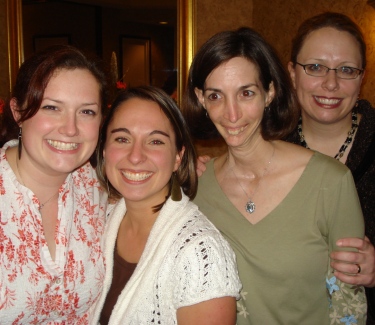Summary of Winston Smith’s Plenary, ‘Groaning and Slavery’ (CCEF Conference Live Blog)
(I am writing these little summaries in between the live blog entries to let you know how Fred and I experienced the conference–and to give you just a flavor of the live blogs in case you were scared off by the 60,000 word count. 🙂 )
We were SO tired Saturday morning–that east coast time zone thing is a killer. Plus, I was happily exhausted after spending time with three of the PeaceGals moderators (and Sarah Joy’s family!) at a real-Philly-cheese-steak-yummy restaurant:
(Hi Sarah Joy, Ruth, and Emily!)
But of course Fred and I were so excited for the day’s sessions that we jumped right out of bed and headed to devotionals and worship. We could wait to hear Winston Smith’s plenary–and it did not disappoint.
Please do consider reading the entire Live Blog transcript–I really think you’ll be edified and encouraged by it! Here are just a few notes from what he shared …
We’re going to be talking this morning about groaning in slavery. We’re going to hang out in the Old Testament and let the slavery and groanings of addicts ring out so that we can truly appreciate what happens when Jesus appears. And so that we can see how the hope and grace of God is there throughout the Old Testament as well. This helps us to celebrate the hope and grace that Jesus brings to us when He comes.
One of the most important ways that the Old Testament gives us hope and helps us to see grace is that it puts us all on common ground right from the beginning. We are all on common ground with the addict.
(Reads from Genesis 3.)
We are tempted. We begin to listen to the lie (“Did God really say?”). There is enticement. We begin to hold before our eyes the thing that we delight in. Our heart skips a bit. It is forbidden. It must be done in secret. Our desire builds. We indulge. We experience misery and sin; immediately there is covering, hiding, blame-shifting. And we are tempted. Again.
But there is a surprising display of hope and grace right there in Genesis 3. Yes, it is loaded down with painful consequences. But even in the consequences there is grace and hope.
God could’ve ended the Bible at Genesis 3. But even in the middle of Genesis 3 (15), there is the promise that God will bring the Deliverer to crush the head of Satan. Anything that you ever put the weight of your hope on will crumble beneath you and disappoint you–this is God’s grace! So we keep looking for the Savior.
Not to say that there are not different forms of slavery … there are. Prescription pain meds and sneaking to fridge? Different. Yes, common ground. But different flavor. Impact is different. Recovery looks slightly different, but it is the same path.
(Read from Eugene Peterson’s paraphrase of Psalm 88.)
We all live in a world where we are sinned against and we suffer. We live in a fallen world and we are afflicted. And yes, we also suffer because we make horrible choices. But we ALL make horrible choices and we have to live in the consequences of that. That doesn’t make the addict different from us. We don’t have to do religious calculus and try to calculate how much is your fault, fallen world, etc. At some point, we are all the same as the addict.
So, hear the hope in Psalm 88. There is real hope in groaning itself. Scripture is giving us a license to speak out when we are suffering. Life in a fallen world really does hurt. You get to say, “Ouch!” I don’t understand this, God. I don’t know why I do what I do. This really hurts. I don’t like it.
The psalmist doesn’t have a clue what God is up to — but he IS directing his words to God. The conversation with God implies some level of faith. That’s a good thing.
Another reason for hope? God himself wrote Psalm 88. Yes, human author; but carried along by the Spirit of Christ. God gets it. He knows you. He knows you in your darkest moment when you think only darkness is your friend. He is with you in the groaning; groaning on your behalf.
When you think you are alone and you have no other friend? God is with you.


